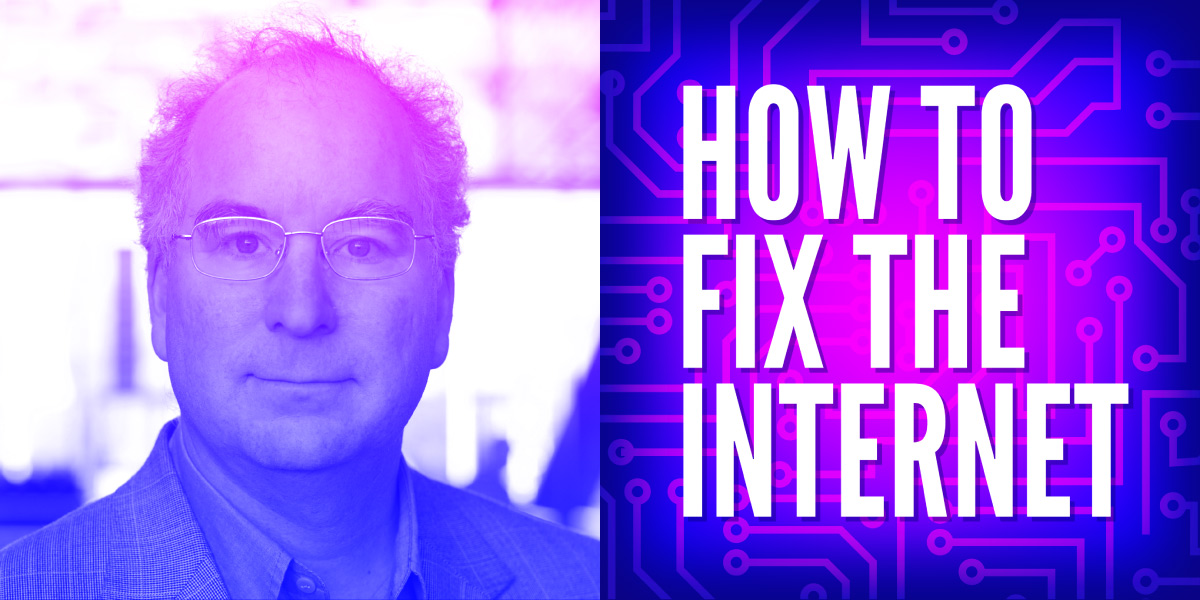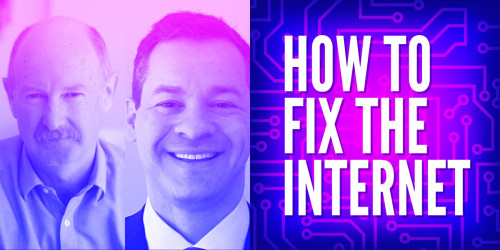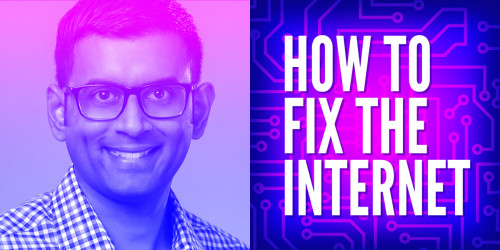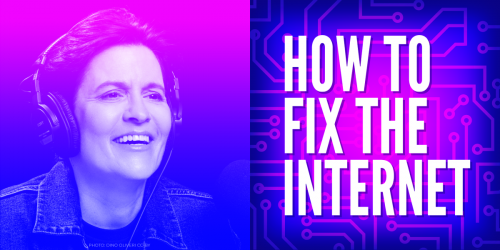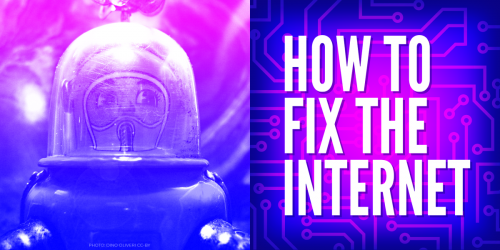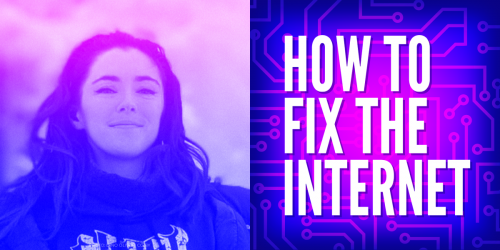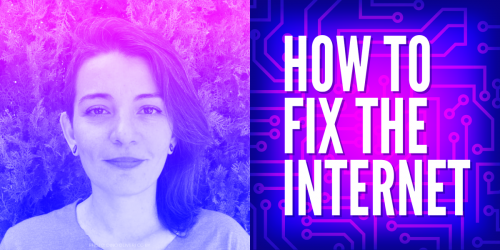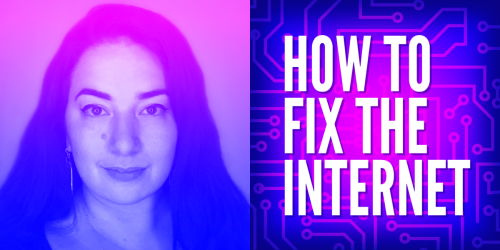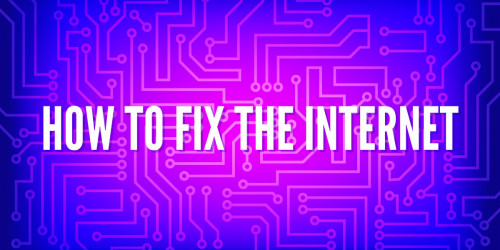All this season, “How to Fix the Internet” has been focusing on the tools and technology of freedom – and one of the most important tools of freedom is a library. Access to knowledge not only creates an informed populace that democracy requires, but also gives people the tools they need to thrive. And the internet has radically expanded access to knowledge in ways that earlier generations could only have dreamed of – so long as that knowledge is allowed to flow freely.

(You can also find this episode on the Internet Archive and on YouTube.)
A passionate advocate for public internet access and a successful entrepreneur, Brewster Kahle has spent his life intent on a singular focus: providing universal access to all knowledge. The Internet Archive, which he founded in 1996, now preserves 99+ petabytes of data - the books, Web pages, music, television, government information, and software of our cultural heritage – and works with more than 400 library and university partners to create a digital library that’s accessible to all. The Archive is known for the Wayback Machine, which lets users search the history of almost one trillion web pages. But it also archives images, software, video and audio recordings, documents, and it contains dozens of resources and projects that fill a variety of gaps in cultural, political, and historical knowledge. Kahle joins EFF’s Cindy Cohn and Jason Kelley to discuss how the free flow of knowledge makes all of us more free.
In this episode you’ll learn about:
- The role AI plays in digitizing, preserving, and easing access to all kinds of information
- How EFF helped the Internet Archive fight off the government’s demand for information about library patrons
- The importance of building a decentralized, distributed web to finding and preserving information for all
- Why building revolutionary, world-class libraries like the Internet Archive requires not only money and technology, but also people willing to dedicate their lives to the work
- How nonprofits are crucial to filling societal gaps left by businesses, governments, and academia
Brewster Kahle is the founder and digital librarian of the Internet Archive, which is among the world’s largest libraries and serves millions of people each day. After studying AI at and graduating from the Massachusetts Institute of Technology in 1982, Kahle helped launch the company Thinking Machines, a parallel supercomputer maker. In 1989, he helped create the internet's first publishing system called Wide Area Information Server (WAIS); WAIS Inc. was later sold to AOL. In 1996, Kahle co-founded Alexa Internet, which helps catalog the Web, selling it to Amazon.com in 1999. He is a former member of EFF’s Board of Directors.
Resources:
- EFF Legal Cases: Internet Archive et al v Mukasey et al (NSA letter/gag order)
- EFF Legal Cases: Hachette v. Internet Archive (publishers’ lawsuit)
- National Public Radio: “As the Trump administration purges web pages, this group is rushing to save them” (March 23, 2025)
- BBC: “An inside look at how the Internet Archive saves the web” (May 26, 2025)
- American Libraries: “Newsmaker: Brewster Kahle” (June 4, 2025)
What do you think of “How to Fix the Internet?” Share your feedback here.
Transcript
BREWSTER KAHLE: I think we should start making some better decisions, a little bit more informed, a little better communication with not only people that are around the world and finding the right people we should be talking to, but also, well, standing on the shoulders of giants. I mean, we can then go and learn from all the things that people have learned in the past. It's pretty straightforward what we're trying to do here. It's just build a library.
CINDY COHN: That's Internet Archive founder Brewster Kahle on what life could look like we all got to experience his dream of universal access to all human knowledge.
I'm Cindy Cohn, the executive director of the Electronic Frontier Foundation
JASON KELLEY: And I'm Jason Kelley - EFF's activism director. And this is our podcast How to Fix the Internet.
CINDY COHN: This show is about what the world could look like if we get things right online - we hear from activists, computer engineers, thinkers, artists and today, a librarian, about their visions for a better digital future that we can all work towards.
JASON KELLEY: And our guest today is someone who has been actively making the internet a better place for several decades now.
CINDY COHN: Brewster Kahle is an early internet pioneer, and a longtime advocate for digitization. He’s a computer engineer but also a digital librarian, and he is of course best known as the founder of the Internet Archive and the Wayback Machine. EFF and the Archive are close allies and friends, and Brewster himself was a member of EFF’s Board of Directors for many years. I’m proud to say that the Archive is also a client of EFF, including most recently when we served as part of the legal team trying to protect true library lending of digital materials like ebooks and audiobooks.
JASON KELLEY: All season we’ve been focusing on the tools and technologies of freedom – and one of the most important tools of freedom is a library.
We started off our conversation by getting his take on the role that AI should play in his vision of a universally accessible library.
BREWSTER KAHLE: AI is absolutely critical and actually has been used for, well, a long period of time. You just think of, how does the magic of Google search happen, where you can just type a few words and get 10 links and several of them are actually really quite relevant. How do you do that? Those of us old enough to remember just keyword searching, that didn't work very well.
So it's going and using all this other information, metadata from other websites, but also learning from people, and machine learning at scale, that we've been able to make such progress.
Now there's the large language models, the generative AI, which is also absolutely fantastic. So we are digitizing obscure newsletters from theological missions in distant parts of the world. We are digitizing agricultural records and from over decades of the 20th century.
And these materials are absolutely relevant now with climate change in our new environments because, well, things are moving. So the pests that used to be only in Mexico are now in Louisiana and Texas. It's completely relevant to go and learn from these, but it's not gonna be based on people going and doing keyword search and finding that newsletter and, and learning from it. It's gonna be based on these augmentations, but take all of these materials and try to make it useful and accessible to a generation that's used to talking to machines.
CINDY COHN: Yeah, I think that that's a really important thing. One of my favorite insights about AI is that it's a very different user interface. It's a way to have a conversational access to information. And I think AI represents one of those other shifts about how people think about accessing information. There's a lot of side effects of AI and we definitely have to be serious about those. But this shift can really help people learn better and find what they're looking for, but also find things that maybe they didn't think they were looking for.
BREWSTER KAHLE: If we do it well, if we do it with public AI that is respectful, the opportunity for engaging people and in a more deep way to be able to have them get to literature that has been packed away, and we've spent billions of dollars in the library system over centuries going and building these collections that are now going to be accessible, not just to the reference librarian, not just to researchers, but to kind of anybody.
JASON KELLEY: Can I dig into this backstory of yours a little bit? Because you know, a lot of people may know how you ended up building the Internet Archive, but I don't think they know enough. I'd like to get more people to sort of have a model in tech for what they can do if they're successful. And you were, if I understand it right, you were one of the early successful internet stories.
You sold a company or two in the nineties and you could have probably quit then and instead you ended up building the Internet Archive. Did you have this moment of deciding to do this and how did you end up in library school in the first place?
BREWSTER KAHLE: So I'm a little unusual in that I, I've only had one idea in my life, and so back in college in 1980 a friend posed, okay, you're an idealist. Yes. And a technologist. Yes. Paint a portrait that's better with your technology. It turned out that was an extremely difficult question to answer.
We were very good about complaining about things. You know, that was Cold War Times and Nicaragua and El Salvador, and there's lots of things to complain about, but it was like. What would be better? So I only came up with two ideas. one was protect people's privacy, even though they were going to throw it away if they were given the chance.
And the other was build the library of everything, the building of the library of everything, the digital library of Alexandria seemed too obvious. So I tried to work on the privacy one, but I couldn't make chips to encrypt voice conversations cheap enough to help the people I wanted to, but I learned how to make chips.
But then that got me engaged with the artificial intelligence lab at MIT and Danny Hillis and Marvin Minsky, they had this idea of building a thinking machine and to go and build a computer that was large enough to go and search everything. And that seemed absolutely critical.
So I helped work on that. Founded a company, Thinking Machines. That worked pretty well. So we got the massively parallel computers. We got the first search engine on the internet, then spun off a company to go and try to get publishers online called WAIS Incorporated. It came before the web, it was the first publishing system.
And so these were all steps in the path of trying to get to the library. So once we had publishers online, we also needed open source software. The free and open source software movement is absolutely critical to the whole story of how this whole thing came about, and open protocols, which was not the way people thought of things. They would go and make them proprietary and sue people and license things, but the internet world had this concept of how to share that ran very, very well. I wasn't central in the ARPANET to the internet conversation. But I did have quite a bit to do with some of the free and open source software, the protocol development, the origins of the web.
And once we had publishers, then, onboard, then I could turn my attention to building the library in 1996, so that's 28 years ago, something like that. And so we then said, okay, now we can build the library. What does that make up of? And we said, well, let's start with the web. Right? The most fragile of media.
I mean, Tim's system, Tim Berners-Lee's system, was very easy to implement, which was kind of great and one of the keys for his success, but it had some really, basically broken parts of it. You think of publishers and they would go and make copies and sell them to individuals or libraries, and they would stay alive much longer than the publishers.
But the web, there's only one copy and it's only on one machine. And so if they change that, then it's gone. So you're asking publishers to be librarians, which is a really bad idea. And so we thought, okay, why don't we go and make a copy of everything that was on the web. Every page from every website every two months.
And turns out you could do that. That was my Altavista moment when I actually went to see Altavista. It was the big search engine before Google and it was the size of two Coke machines, and it was kind of wild to go and look - that's the whole web! So the idea that you could go and gather it all back up again, uh, was demonstrated by Altavista and the Internet Archive continued on with other media type after media type, after media type.
JASON KELLEY: I heard you talk about the importance of privacy to you, and I know Cindy's gonna wanna dig into that a little bit with some of the work that EFF and the Archive have done together.
CINDY COHN: Yeah, for sure. One of the things I think, you know, your commitment to privacy is something that I think is very, very important to you and often kind of gets hidden because the, you know, the archive is really important. But, you know, we were able to stand up together against national security letters, you know, long before some of the bigger cases that came later and I wanted to, you know, when you reached out to us and said, look, we've gotten this national security letter, we wanna fight back. Like, it was obvious to you that we needed to push back. And I wanna hear you talk about that a little bit.
BREWSTER KAHLE: Oh, this is a hero day. This is a hero moment for EFF and its own, you know, I, okay.
CINDY COHN: Well, and the Archive, we did it together.
BREWSTER KAHLE: Well, no, we just got the damn letter. You saved our butts. Okay. So how this thing worked was in 2001,they passed this terrible law, the Patriot Act, and they basically made any government official almost be able to ask any organization and be able to get anything they wanted and they had a gag order. So not only could they just get any information, say on patrons’ reading habits in a library, they could make it so that you can't tell anybody about it.
So I got sat down one day and Kurt Opsahl from EFF said, this isn't your best day. You just got a letter demanding information about a patron of the Internet Archive. I said, they can't do that. He said, yeah, they can. And I said, okay, well this doesn't make any sense. I mean, the librarians have a long history of dealing with people being surveilled on what it is they read and then rounded up and bad things happen to them, right? This is, this is something we know how that movie plays out.
So I said, Kurt, what, what can we do? And he said, you have to supply the data. I said, what if we don't? And he said, jail. That wasn't my favorite sentence. So is there anything else we can do? And he said, well, you can sue the United States government. (laughter)
OH! Well I didn't know even know whether I could bring this up with my board. I mean, remember there's a gag order. So there was just a need to know to be able to find out from the engineers what it is we had, what we didn't have. And fortunately we never had very much information. 'cause we don't keep it, we don't keep IP addresses if we possibly can. We didn't have that much, but we wanted to push back. And then how do you do that? And if it weren't for the EFF, and then EFF got the ACLU involved on a pro bono basis, I would never have been able to pull it off! I would have to have answered questions to the finance division of how, why are we spending all this money on lawyers?
The gag order made it so absolutely critical for EFF to exist, and to be ready and willing and funded enough to take on a court case against the United States government without, you know, having to go into a fundraising round.
But because of you, all of you listeners out there donating to EFF, having that piggy bank made it so that they could spring to the defense of the Internet Archive. The great thing about this was that after this lawsuit was launched, the government wanted out of this lawsuit as fast as possible.
They didn't want to go and have a library going and getting a court case to take their little precious toy of this Patriot Act, National Security letters away from them. So they wanted out, but we wouldn't let them. We wanted to be able to talk about it. They had to go and release the gag order. And I think we're only one or two or three organizations that have ever talked publicly about the hundreds of thousands, if not millions, of national security letters because we had EFF support.
CINDY COHN: Oh, thank you Brewster. That's very sweet. But it was a great honor to get to do this. And in hearing you talk about this future, I just wanna pull out a few of the threads. One is privacy and how important that is for access for information. Some people think of that as a different category, right? And it's not. It's part and parcel of giving people access to information.
I also heard the open source community and open protocols and making sure that people can, you know, crawl the web and do things with websites that might be different than the original creator wanted, but are still useful to society.
The other thing that you mentioned that I think it's important to lift up as well is, you know, when we're talking about AI systems, you're talking about public AI, largely. You're talking about things that similarly are not controlled by just one company, but are available so that the public really has access not only to the information, but to the tools that let them build the next thing.
BREWSTER KAHLE: Yes, the big thing I think I may have gotten wrong starting this whole project in 1980 was the relaxation of the antitrust laws in the United States, that we now have these monster organizations that are not only just dominating a country's telecom or publishing systems or academic access, but it's worldwide now.
So we have these behemoth companies. That doesn't work very well. We want a game with many winners. We want that level playing field. We wanna make it so that new innovators can come along and, you know, try it out, make it go. In the early web, we had this, we watched sort of the popularity and the movement of popularity. And so you could start out with a small idea and it could become quite popular without having to go through the gatekeepers. And that was different from when I was growing up. I mean, if you had a new idea for a kid's toy, trying to get that on the shelves in a bunch of toy stores was almost impossible.
So the idea of the web and the internet made it so that good ideas could surface and grow, and that can work as long as you don't allow people to be gatekeepers.
We really need a mechanism for people to be able to grow, have some respect, some trust. If we really decrease the amount of trust, which is kind of, there's a bonfire of trust right now, then a lot of these systems are gonna be highly friction-full.
And how do we go and make it so that, you know, we have people that are doing worthwhile projects, not exploiting every piece of surveillance that they have access to. And how do we build that actually into the architecture of the web?
CINDY COHN: That leads, I think, directly into the kind of work that the archive has done about championing the distributed web, the D-web work. And you've done a real lot of work to kind of create a space for a distributed web, a better web. And I want you to tell me a little bit about, you know, how does that fit into your picture of the future?
BREWSTER KAHLE: The wonderful thing about the internet still is that it can be changed. It's still built by people. They may be in corporations, but you can still make a big dent and, there were a couple “aha” moments for me in, in trying to, like, why do we build a better web? Right? what's the foundational parts that we need to be able to do that?
And we ended up with this centralization, not only of all the servers being in these colos that are operated by other companies and a cloud-based thing, other people own everything, that you can't go and just take your computer on your desk and be a first class internet thing. That used to be possible with Gopher and Waze and the early web. So we lost some of those things, but we can get them back.
Jason Scott at the Internet Archive, working with volunteers all over, made emulators of the early computers like IBM PCs and Macintosh and these old computers, Commodore 64, Atari machines, and they would run in JavaScript in your browser, so you could click and go and download an IBM PC and it boots in your browser and it uses the Internet Archive as a giant floppy drive to run your favorite game from 20 years ago. The cool thing about that for me, yes, I could get to play all my old games, it was kind of great, but we also had this ability to run a full on computer in your browser, so you didn't even have to download and install something.
So you could go and be a computer on the internet, not just a consumer, a reader. You could actually be a writer, you could be a publisher, you could, you could do activities, you could, so that was fantastic. And then another big change was the protocols of the browsers change to allow peer-to-peer interactions. That's how you get, you know, Google Meet or you get these video things that are going peer to peer where there's no central authority going in, interrupting your video streams or whatever.
So, okay, with these tools in hand now, then we could try to realize part of the dream that a lot of us had originally, and even Tim Burners Lee, of building a decentralized web. Could you make a web such that your website is not owned and controlled on some computer someplace, but actually exists everywhere and nowhere, kind of a peer-to-peer backend for the web.
Could you make it so that if you run a club, that you could do a WordPress-like website that would then not live anywhere, but as readers were reading it, they would also serve it. And there would be libraries that would be able to go and archive it as a living object, not as just snapshots of pages. That became possible. It turns out it's still very hard, and the Internet Archive started pulling together people, doing these summits and these different conferences to get discussions around this and people are running with it.
CINDY COHN: Yeah, and so I love this because I know so many people who go to the archive to play Oregon Trail, right? And I love it when I get a chance to say, you know, this isn't just a game, right? This is a way of thinking that is reflected in this. I kind of love that, you know, ‘you died with dysentery’ becomes an entryway into a whole other way of thinking about the web.
JASON KELLEY: Let's take a quick moment to thank our sponsor. How to Fix The Internet is supported by the Alfred P. Sloan Foundation's program and public understanding of science and technology enriching people's lives through a keener appreciation of our increasingly technological world and portraying the complex humanity of scientists, engineers, and mathematicians.
We also wanna thank EFF donors. You're the reason we exist, and EFF has been fighting for digital rights for 35 years, and that fight is bigger than ever. So please, if you like what we do, go to eff.org/pod to donate. And also, if you can’t make it in person to this year’s EFF awards where we celebrate the people working towards the better future we all care so much about, you can watch the whole event at eff.org/awards.
We also wanted to share that our friend Cory Doctorow, has a new podcast, have a listen to this:
WHO BROKE THE INTERNET TRAILER: How did the internet go from this? You could actually find what you were looking for right away, to this, I feel I can inhale. Spoiler alert, it was not an accident. I'm Cory Doctorow, host of Who Broke the Internet from CBC's Understood. In this four part series, I'm gonna tell you why the internet sucks now, whose fault it is and my plan to fix it. Find who broke the internet on whatever terrible app you get your podcasts.
JASON KELLEY: And now back to our conversation with Brewster Kahle.
The fact that you do things like archive these old games is something that I think a lot of people don't know. There are just so many projects that the internet archive does and it is interesting to hear how they're sort of all building towards this better future that is sort of built, like, sort of makes up the bones of the work that you do. Can you talk about any of the other projects that you are particularly sort of proud of that maybe other people haven't heard about?
BREWSTER KAHLE: Yeah, and I really wanna apologize. If you go to archive.org, it is daunting. Most people find things to read in the Internet Archive or see in the internet archive, mostly by going to search engines, or Wikipedia. For instance, we really dedicated ourselves to try to help reinforce Wikipedia. We started archiving all of the outbound links. And we figured out how to work with the communities to allow us to fix those broken links. So we've now fixed 22 million broken links in Wikipedia, 10,000 a day get now added to go back to the Wayback Machine.
Also, there are about two million books that are linked straight into, if you click on it, it goes right to the right page so you can go and see the citation. Not only is this important for homework, people that are after hours trying to cram for their, uh, for their homework, um, but it's also important for Wikipedians because, um, links in Wikipedia that go to someplace you can actually cite is a link that works, it gets more weight.
And if we're going to have all the literature, the scholarly literature and the book literature available in Wikipedia, it needs to be clickable. And you can't click your way into a Overdrive borrowed book from your library. You have to be able to do this from, something like the Internet Archive. So Wikipedia, reinforcing Wikipedia.
Another is television. We've been archiving television. 24 hours a day since the year 2000. Russian, Chinese, Japanese, Iraqi, Al Jazeera, BBC, CNN, ABC, Fox, 24 hours a day, DVD quality. And not all of it is available but the US television news, you can search and find things. And we're also doing summarizations now, so you can start to understand – in English – what is Russian State television telling the Russians? So we can start to get perspectives. Or look inside other people's bubbles to be able to get an idea of what's going on. Or a macroscope ability to step back and get the bigger picture. That's what libraries are for, is to go and use these materials in new and different ways that weren't the way that the publishers originally intended.
Other things. We've digitizing about 3000 books a day. So that's going along well. Then we are doing Democracy’s Library. Democracy's Library, I think is a cool one. So democracies need an educated populace. So they tend to publish openly. Authoritarian governments and corporations don't care about having an educated populace. That's not their goal. They have other goals, um, but democracies want things to be openly available.
But it turns out that even though the United States, for instance, and all democracies publish openly, most of those materials are not available publicly. They may be available in some high priced database system of somebody or other. But mostly they're just not available at all.
So we launched the Democracy's Library Project to go and take all of the published works at the federal level, the provincial state level, and municipal levels, and make that all available in bulk and in services so that other people could also go and build new services on this. We launched it with Canada and the United States. The Canadians are kicking the United States's butt. I mean, they're doing so great. So Internet Archive Canada, working with University of Toronto, and universities all over, have already digitized all of the federal print materials, and by working with the national library there have archived the government websites in Canada.
In the United States we've been archiving, with the help of many others, including historically with the Library of Congress, and National Archives to go and collect all of the web pages and services and data sets from all of the United States Federal websites from before and after every presidential election. It's called the End of Term Crawl, and this has been going on since 2008, and we've gotten into a lot of news recently because this administration has decided to take a lot of materials off the web. And again, asking a publisher, whether it's a government or commercial publisher or a social media publisher, to go and be their own archive or their own library is a bad idea. Don't trust a corporation to do a library's job, was what one headline said.
So we've been archiving all of these materials and making them available. Now, can we weave them back into the web with the right URLs? No, not yet. That's up to the browser companies and also some of the standards organizations. But it's, at least it's there and you can go to the Wayback Machine to find it.
So the Internet Archive is about the 200th most popular website.
We get millions of people a day coming to the website, and we get about 6 million people coming and using the internet archives resources that we don't even, they don't even come to the website. So it's just woven into the fabric of the web. So people say, oh, I've never heard of that. Never used it. It's like you probably have. It’s just part of how the internet works, it's plumbing.
So those are the aspects of the Internet Archive that are currently going on. We have people coming in all the time saying. Now, but are you doing this? And I said, no, but you can and we can be infrastructure for you. I think of the Internet Archive as infrastructure for obsessives. So the people that say, I really need this to persist to the next generation. We say, great, what do you need? How do we make that come true?
CINDY COHN: Yeah, I think that's both the superpower and in some ways the thing that the Internet Archive struggles with, which is because when your infrastructure, people don't think about you and they don't wanna think about you, so that when you come under attack, it's hard to get people to see what they might be losing.
And I think one of the things that, you know, one of the reasons I wanted you to come on here and talk about the archive is I think we need to start making some of that invisible stuff visible because it's not magic. It's not automatic. It takes, you know, I mean, your personal courage in standing up is wonderful, but there need to be hundreds and thousands and hundreds of thousands saying, you know, this is our library, this is our future.
This is, you know, this is important and, and we need to stand up and hopefully if we stand up enough, you know, we don't have to do it every four years or so. But you know, the number of people who I sent to the Wayback Machine when they were very, very worried about US government information going down and, and pointed out, look, you know, the archive's been quietly doing this for, you know, nearly 20 years now, is a lot. And that's because again, you're kind of quietly doing the important work.
And so, you know, my hope is that ,with this podcast and otherwise, we get a little more attention so that we can really build this better future and, and maybe in the better future, we don't have to think about it again. But right now there's a lot of different kinds of attacks.
BREWSTER KAHLE: It's a challenging time, especially in the United States for libraries. There's the book bannings, defunding. Probably structurally the worst thing is the licensing model. The idea that there's no digital ownership. I mean, just like really bad behavior on the part of the corporations. Um, so, but Internet Archive Canada is doing well. Internet Archive Europe is coming back up and serving interesting roles with public AI to go and do publicly oriented values driven AI technology, which is kind of great. We'd like to see internet archives planted in lots of places. The idea that we can just depend on the United States jurisdictions for being the information resource for the world I think that train is gone.
So let's go and build a robust infrastructure. It's kinda like what we saw out the internet. Can we build internet archives all over the world? And that takes not only money, but actually the money part is probably not the hardest part. It's people interested in dedicating their lives to open – to open source software, free and open source software, open access materials, the infrastructure to step out and work in non-profits as opposed to some of the, you know, the very tempting, um, stock option deals that come from these these VC-funded whatevers, um, and work and do the good work that they can point to and they can be proud of for the rest of their lives.
CINDY COHN: Yeah. And there is something so important about that, about getting to wake up every day and feel like you're making the world better. And I think your particular story about this, because you know, you made money early on, you did some companies and you decided to dig back into the public side of the work rather than, you know, stepping back and becoming a VC or, you know, buying your third island, or those kinds of things.
And I think that one of the things that's important is that I feel like there's a lot of people who don't think that you can be a technologist and a successful person without being an asshole. And, you know, I think you're a good counter example of somebody who is deeply technical, who thinks about things in a, you know, how do we build better infrastructure, who understands how all of these systems work. And use that information to build good, rather than, you know, necessarily deciding that the, you know, the best thing to do is to maybe take over a local government and build a small fiefdom to yourself.
BREWSTER KAHLE: Well, thank you for that. And yes, for-profit entities are gasoline. They're explosive and they don't tend to last long. But I think one of the best ideas the United States has come up with is the 501 C3 public charity, which is not the complete antidote to the C corporations that were also put across by the United States since World War II in ways that shouldn't have been, but the 501 C3 public charities are interesting. They tend to last longer. They take away the incentive to sell out, yet leave an ability to be an operational entity. You just have to do public good. You have to actually live and walk the walk and go and do that. But I think it's a fabulous structure. I mean, you, Cindy, how old is the EFF now?
CINDY COHN: 35. This is our 35th anniversary.
BREWSTER KAHLE: That's excellent. And the Internet Archive is like 28, 29 years old, and that's a long time for commercial, excuse me, for commercial entities or tech! Things in the tech world, they tend to turn over. So if you wanna build something long term, and you're willing to only do, as Lessig would put it, some rights reserved, or some profit motive reserved. Then the 501 C3 public charities, what other countries are adopting, this model is a mechanism of building infrastructure that can last a long time where you get your alignment with the public interest.
CINDY COHN: Yeah, I think that's right. And it's been interesting to me for the, you know, being in this space for a really long time, the nonprofit salaries, the nonprofit may not be as high, but the jobs are more stable. Like we don't have in our sector the waves of layoffs. I mean, occasionally for sure we're, you know, that that is a thing that happens in the nonprofit digital rights sector. But I would say compared to the for-profit world, there’s a much more stable structure, um, because you don't have this gasoline idea, these kind of highs and lows and ups and downs. And that could be, you know, there's nothing wrong with riding that wave and making some money. But the question becomes, well, what do you do after that? Do you take that path to begin with? Or do you take that path later, when you've got some assets, you know, some people come outta school with loans and things like that.
BREWSTER KAHLE: So we need this intermediary between the academic, the dot edu, and the dot com, and I think the dot org is such a thing. And also there was a time when we did a lot in dot gov of bringing civic tech. And civic tech in Canada is up and running and wonderful. So there's things that we can do in that.
We can also spread these ideas into other sectors like banking. How about some nonprofit banks, please? Why don't we have some nonprofit housing that actually supports nonprofit workers? We're doing an experiment with that to try to help support people that want to work in San Francisco for nonprofits and not feel that they have to commute from hours away.
So can we go and take some of these ideas pioneered by Richard Stallman, Larry Lessig, Vince Sur, the Cindy Cohns, and go and try it in new sectors? You're doing a law firm, one of the best of the Silicon Valley law firms, and you give away your product. Internet Archive gives away its product. Wikipedia gives away its product. This is, like, not supposed to happen, but it works really well. And it requires support and interest of people to work there and also to support it from the outside. But it functions so much better. It's less friction. It's easier for us to work with non other non-profits than it is to work with for-profits.
JASON KELLEY: Well I'm glad that you brought up the nonprofit points and really dug into it because earlier, Brewster, you mentioned the people listening to this are, you know, the reason you were able to fight back against the NSL letters is that EFF has supporters that keep it going, and those same supporters, the people listening to this are hopefully, and probably, the ones that help keep the Archive going. And I just wanted to make sure people know that the Archive is also supported by donors. And, uh, if people like it, they, they, there's nothing wrong with supporting both EFF and the Archive, and I hope everyone does both.
CINDY COHN: Yeah. There's a whole community. And one of the things that Brewster has really been a leader in is seeing and making space for us to think of ourselves as a community. Because we're stronger together. And I think that's another piece of the somewhat quiet work that Brewster and the Archive do is knitting together the open world into thinking of itself as an open world and, able to move together and leverage each other.
BREWSTER KAHLE: Well thank you for all the infrastructure EFF provides. And if anybody's in San Francisco, come over on a Friday afternoon at ! And we give it to her! If I'm here, I give it to her and try to help answer questions. We even have ice cream. And so the idea is to go and invite people into this other alternative form of success that maybe they weren't taught about in business school or, or, or, uh, you know, they want to go off and do something else.
That's fine, but at least understand a little bit of how the underlying structures of the internet, whether it's some of the original plumbing, um, some of these visions of Wikipedia, Internet Archive. How do we make all of this work? And it's by working together, trusting each other to try to do things right, even when the technology allows you to do things that are abusive. Stepping back from that and building, uh, the safeguards into the technology eventually, and celebrate what we can get done to support a better civic infrastructure.
CINDY COHN: That is the perfect place to end it. Thank you so much, Brewster, for coming on and bringing your inspiration to us.
JASON KELLEY: I loved that we wrapped up the season with Brewster because really there isn't anything more important, in a lot of ways, to freedom than a library. And the tool of freedom that Brewster built, the Internet Archive and all of the different pieces of it, is something that I think is so critical to how people think about the internet and what it can do, and honestly, it's taken for granted. I think once you start hearing Brewster talk about it, you realize just how important it is. I just love hearing from the person who thought of it and built it.
CINDY COHN: Yeah, he's so modest. The “I only had one idea,” right? Or two ideas, you know, one is privacy and the other is a universal access to all the world's information. You know, just some little things.
JASON KELLEY: Just a few things that he built into practice.
CINDY COHN: Well, and you know, he and a lot of other people, I think he's the first to point out that this is a sector that there's a lot of people working in this area and it's important that we think about it that way.
It does take the long view to build things that will last. And then I think he also really talked about the nonprofit sector and how, you know, that space is really important. And I liked his framing of it being kind of in between the dot edu, the academics and the dot com, that the dot orgs play this important role in bringing the public into the conversation about tech, and that's certainly what he's done.
JASON KELLEY: I loved how much of a positive pitch this was for nonprofits, and I think a lot of people think of charities they don't think about EFF necessarily, or the Internet Archive, but this tech sector of nonprofits is, you know, that community you talked about all working together to sort of build this structure that protects people's rights online and also gives them access to these incredible tools and projects and resources and, you know, everyone listening to this is probably a part of that community in one way or another. It's much bigger than I think people realize.
CINDY COHN: Yeah. And whether you're contributing code or doing lawyering or doing activism, you know, there's, there's spaces throughout, and those are only just three that we do.
But the other piece, and, and you know, I was very of course honored that he told the story about national security letters, but, you know, we can support each other. Right. That when somebody in this community comes under attack, that's where EFF often shows up. But when, you know, he said people have ideas and they wanna be able to develop them, you know, the archive provides the infrastructure. All of this stuff is really important and important to lean into in this time when we're really seeing a lot of public institutions and nonprofit institutions coming under attack.
What I really love about this season, Jason, is the way we've been able to shine our little spotlight on a bunch of different pieces of the sector. And there's so many more. You know, as somebody who started in this digital world in the nineties when, you know, I could present all of the case law about the internet on one piece of paper in a 20 minute presentation.
You know, watching this grow out and seeing that it's just the beginning has been really, it's been really fun to be able to talk to all of these pieces. And you know, to me the good news is that, that people, you know, sometimes their stories get presented as if they're alone or if there's this lone, you know, it's kind of a superhero narrative. There's this lone Brewster Kahle who's out there doing things, and now of course that's true. Brewster's, you know, again, Brewster's somebody who I readily point to when people need an example of somebody who, who did really well in tech but didn't completely become a money grubbing jerk as a result of it, but instead, you know, plowed it back into the community. It's important to have people like that, but it's also important to recognize that this is a community and that we're building it, and that it’s got plenty of space for the next person to show up and, and throw in ideas.
At least I hope that's how, you know, we fix the internet.
JASON KELLEY: And that's it for this episode and for this season. Thank you to Brewster for the conversation today, and to all of our guests this season for taking the time to share their insight, experience, and wisdom with us these past few months. Everybody who listens, gets to learn a little bit more about how to fix the internet.
That is our goal at EFF. And every time I finish one of these conversations, I think, wow, there's a lot to do. So thank you so much for listening. If you wanna help us do that work, go to eff.org/pod and you can donate, become a member, and um, we have 30,000 members, but we could always use a few more because there is a lot to fix.
Thank you so much. Our theme music is by Nat Keefe of Beat Millware with Reed Mathis. And How to Fix the Internet is supported by the Alfred P. Sloan Foundation's Program in Public Understanding of Science and Technology. I'm Jason Kelley.
CINDY COHN: And I'm Cindy Cohn.
MUSIC CREDITS: This podcast is licensed Creative Commons Attribution 4.0 international, and includes the following music licensed Creative Commons Attribution 3.0 unported by its creators: Drops of H2O, The Filtered Water Treatment by Jay Lang. Additional music, theme remixes and sound design by Gaetan Harris.


